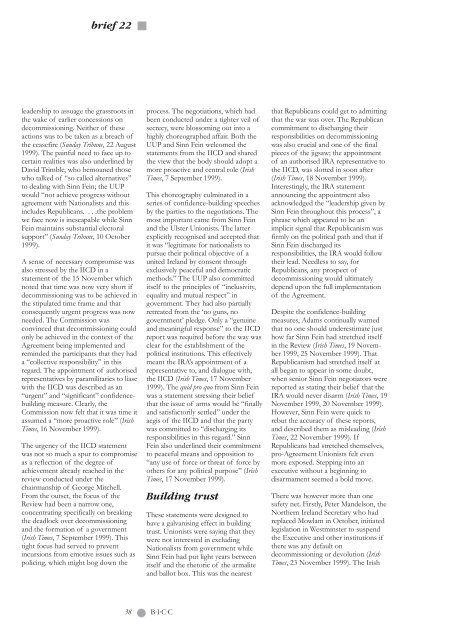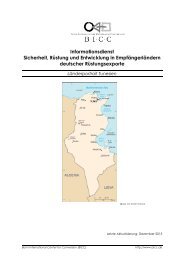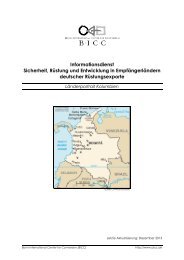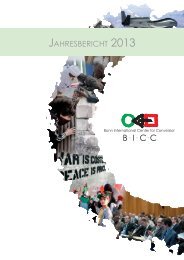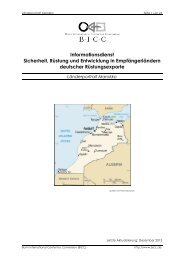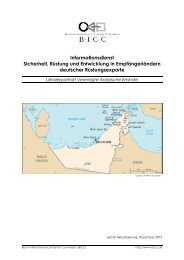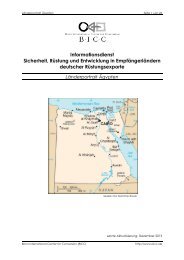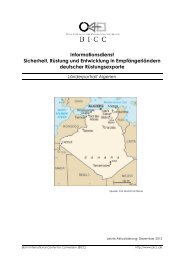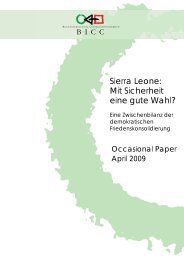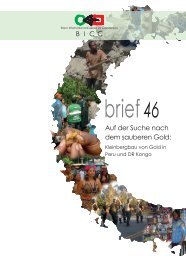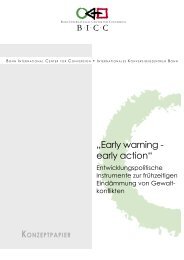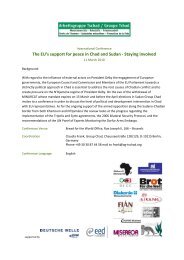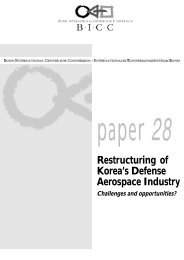English - BICC
English - BICC
English - BICC
You also want an ePaper? Increase the reach of your titles
YUMPU automatically turns print PDFs into web optimized ePapers that Google loves.
ief 22<br />
leadership to assuage the grassroots in<br />
the wake of earlier concessions on<br />
decommissioning. Neither of these<br />
actions was to be taken as a breach of<br />
the ceasefire (Sunday Tribune, 22 August<br />
1999). The painful need to face up to<br />
certain realities was also underlined by<br />
David Trimble, who bemoaned those<br />
who talked of “so called alternatives”<br />
to dealing with Sinn Fein; the UUP<br />
would “not achieve progress without<br />
agreement with Nationalists and this<br />
includes Republicans. . . .the problem<br />
we face now is inescapable while Sinn<br />
Fein maintains substantial electoral<br />
support” (Sunday Tribune, 10 October<br />
1999).<br />
A sense of necessary compromise was<br />
also stressed by the IICD in a<br />
statement of the 15 November which<br />
noted that time was now very short if<br />
decommissioning was to be achieved in<br />
the stipulated time frame and that<br />
consequently urgent progress was now<br />
needed. The Commission was<br />
convinced that decommissioning could<br />
only be achieved in the context of the<br />
Agreement being implemented and<br />
reminded the participants that they had<br />
a “collective responsibility” in this<br />
regard. The appointment of authorised<br />
representatives by paramilitaries to liase<br />
with the IICD was described as an<br />
“urgent” and “significant” confidencebuilding<br />
measure. Clearly, the<br />
Commission now felt that it was time it<br />
assumed a “more proactive role” (Irish<br />
Times, 16 November 1999).<br />
The urgency of the IICD statement<br />
was not so much a spur to compromise<br />
as a reflection of the degree of<br />
achievement already reached in the<br />
review conducted under the<br />
chairmanship of George Mitchell.<br />
From the outset, the focus of the<br />
Review had been a narrow one,<br />
concentrating specifically on breaking<br />
the deadlock over decommissioning<br />
and the formation of a government<br />
(Irish Times, 7 September 1999). This<br />
tight focus had served to prevent<br />
incursions from emotive issues such as<br />
policing, which might bog down the<br />
process. The negotiations, which had<br />
been conducted under a tighter veil of<br />
secrecy, were blossoming out into a<br />
highly choreographed affair. Both the<br />
UUP and Sinn Fein welcomed the<br />
statements from the IICD and shared<br />
the view that the body should adopt a<br />
more proactive and central role (Irish<br />
Times, 7 September 1999).<br />
This choreography culminated in a<br />
series of confidence-building speeches<br />
by the parties to the negotiations. The<br />
most important came from Sinn Fein<br />
and the Ulster Unionists. The latter<br />
explicitly recognised and accepted that<br />
it was “legitimate for nationalists to<br />
pursue their political objective of a<br />
united Ireland by consent through<br />
exclusively peaceful and democratic<br />
methods.” The UUP also committed<br />
itself to the principles of “inclusivity,<br />
equality and mutual respect” in<br />
government. They had also partially<br />
retreated from the ‘no guns, no<br />
government’ pledge. Only a “genuine<br />
and meaningful response” to the IICD<br />
report was required before the way was<br />
clear for the establishment of the<br />
political institutions. This effectively<br />
meant the IRA’s appointment of a<br />
representative to, and dialogue with,<br />
the IICD (Irish Times, 17 November<br />
1999). The quid pro quo from Sinn Fein<br />
was a statement stressing their belief<br />
that the issue of arms would be “finally<br />
and satisfactorily settled” under the<br />
aegis of the IICD and that the party<br />
was committed to “discharging its<br />
responsibilities in this regard.” Sinn<br />
Fein also underlined their commitment<br />
to peaceful means and opposition to<br />
“any use of force or threat of force by<br />
others for any political purpose” (Irish<br />
Times, 17 November 1999).<br />
Building trust<br />
These statements were designed to<br />
have a galvanising effect in building<br />
trust. Unionists were saying that they<br />
were not interested in excluding<br />
Nationalists from government while<br />
Sinn Fein had put light years between<br />
itself and the rhetoric of the armalite<br />
and ballot box. This was the nearest<br />
38 B·I·C·C<br />
that Republicans could get to admitting<br />
that the war was over. The Republican<br />
commitment to discharging their<br />
responsibilities on decommissioning<br />
was also crucial and one of the final<br />
pieces of the jigsaw; the appointment<br />
of an authorised IRA representative to<br />
the IICD, was slotted in soon after<br />
(Irish Times, 18 November 1999).<br />
Interestingly, the IRA statement<br />
announcing the appointment also<br />
acknowledged the “leadership given by<br />
Sinn Fein throughout this process”, a<br />
phrase which appeared to be an<br />
implicit signal that Republicanism was<br />
firmly on the political path and that if<br />
Sinn Fein discharged its<br />
responsibilities, the IRA would follow<br />
their lead. Needless to say, for<br />
Republicans, any prospect of<br />
decommissioning would ultimately<br />
depend upon the full implementation<br />
of the Agreement.<br />
Despite the confidence-building<br />
measures, Adams continually warned<br />
that no one should underestimate just<br />
how far Sinn Fein had stretched itself<br />
in the Review (Irish Times, 19 November<br />
1999, 25 November 1999). That<br />
Republicanism had stretched itself at<br />
all began to appear in some doubt,<br />
when senior Sinn Fein negotiators were<br />
reported as stating their belief that the<br />
IRA would never disarm (Irish Times, 19<br />
November 1999, 20 November 1999).<br />
However, Sinn Fein were quick to<br />
rebut the accuracy of these reports,<br />
and described them as misleading (Irish<br />
Times, 22 November 1999). If<br />
Republicans had stretched themselves,<br />
pro-Agreement Unionists felt even<br />
more exposed. Stepping into an<br />
executive without a beginning to<br />
disarmament seemed a bold move.<br />
There was however more than one<br />
safety net. Firstly, Peter Mandelson, the<br />
Northern Ireland Secretary who had<br />
replaced Mowlam in October, initiated<br />
legislation in Westminster to suspend<br />
the Executive and other institutions if<br />
there was any default on<br />
decommissioning or devolution (Irish<br />
Times, 23 November 1999). The Irish


